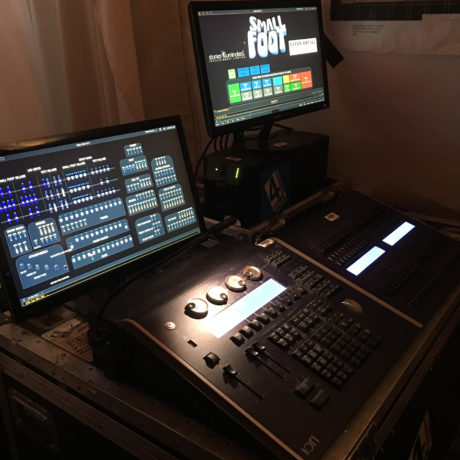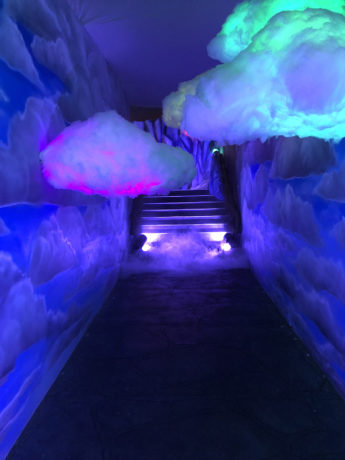
MIDDLETON, WI – Snow came to Hollywood with the Smallfoot Yeti Village, an interactive experience promoting the Warner Bros. movie Smallfoot. The two-story installation at the corner of Hollywood and Vine let visitors walk through the clouds to a mountaintop environment full of Yeti-sized fun before heading down a slide for games in a mountain village. Sohail Najafi, principal lighting designer at Stories Illuminated, was in charge of designing all the lights and effects for the Village. He and his team turned to ETC and the Ion console, with its powerful programming capabilities and flexibility to create the perfect Instagram moments for guests.
More details from ETC (www.etcconnect.com):
“One of the primary goals of the Village was to create lots of little interactive areas where people could play games, or pose for pictures to share on social media. We knew that most of the fixtures providing key light for these areas would have to be hidden away, making the light seem like it was coming from nowhere,” says Najafi. But there were complications. “When we first sent out our bid, we didn’t have 100% knowledge of room shape — because it hadn’t been finalized. So we had to be flexible in building and designing each room. We weren’t sure where the fixtures would be in the room, which meant we couldn’t do a lot of pre-programming.”

Thanks to the Eos workspace, though, programmer Vincent Sanchez was able to create a system that was quick and powerful to get the job done in a compressed time frame. “The simplicity of being able to separate cue lists by rooms, so only lights in this room get recorded by this cue list — that’s awesome,” says Sanchez. “It’s straightforward and reassures you that you aren’t messing up another part of the show.”
Sanchez knew he wouldn’t be there every day to run the show, so he got creative with Eos’ powerful magic sheets capabilities to make the system easy to run. He created a magic sheet with buttons tied to macros that let operators select the state the lights needed to be in — show state, work state, emergency state — and a shutdown button for when they were all done at the end of the night. Macros would change the on-screen button color to indicate what state the rig was currently in and wait for user confirmation via a button press before firing off. “They loved that they didn’t need an expert on hand at all times,” says Najafi.
The magic sheet also included indicator buttons for some of the atmospheric effects the board ran. In addition to controlling the lighting the Ion commanded a DMX-controlled fog machine that created the “clouds” people walked through as they journeyed to the top of the mountain, as well as a snow machine that created the winter wonderland. “We wanted an icon that would light up any time snow was running,” says Sanchez. He created a box with black text and programmed a color to fill the box on the magic sheet when the snow machine was running. The black text would stand out against the color and give operators the system info they needed.
“Being able to trigger a macro, get feedback immediately about your current state, and have the console prompt you about what your next option is — that’s something you don’t find on other consoles,” finishes Sanchez. “It’s why I love the Eos system. Using magic sheets to build a custom layout tailor-made for a space and the people using it is one of the most powerful things ever. I love it.”
For more info about Stories Illuminated, please visit www.storiesilluminated.com


